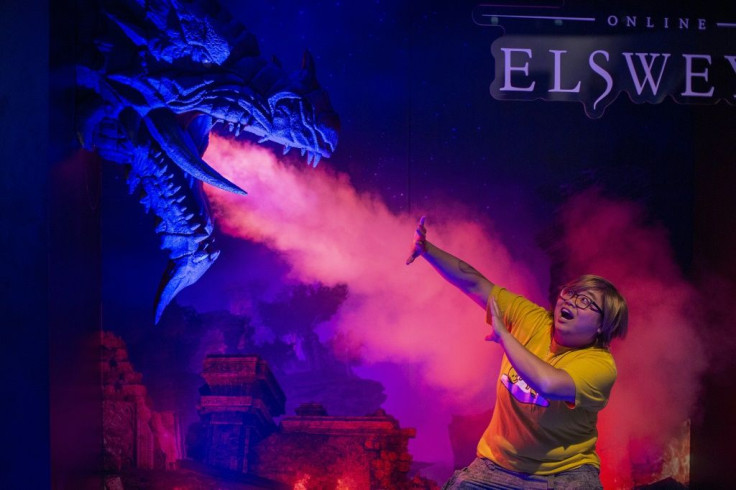Microsoft Acquires Bethesda Game Studios For The Following Reasons
KEY POINTS
- Microsoft's acquisition of Bethesda Game Studios and Zenimax Media sent shockwaves throughout the gaming industry
- With this one move, Microsoft immediately acquired a ton of beloved properties with one purchase
- There is no indication that this acquisition means no more Bethesda games will be seen on the PlayStation, Switch, or PC
The acquisition of Bethesda Game Studios by Xbox parent company Microsoft for $7.5 billion has sent shockwaves throughout the video game industry but the reasons behind this marriage are quite simple.
Bethesda made the big announcement Monday. The move now allows gamers to "play the games they want, with the people they want, anywhere they want."
The acquisition pushes Xbox's in-house game development studios up to 23 and gives the Microsoft gaming brand control over some of the biggest and most in-demand titles today. Games that are also released on competition consoles like the Sony PlayStation.
Since Microsoft produces video game consoles, personal computers, operating systems, and software subscription services, it’s easy to see why people would purchase Microsoft products if they can only find their favorite games on those Microsoft platforms.
Bethesda is, of course, the studio behind very popular franchises like "Fallout," "Doom," and "The Elder Scrolls." If Microsoft wanted to secure a ton of surefire properties in one fell swoop, then it just did so with this move.
After almost a lifetime of working together, we're excited to be joining our longest and closest partner, @Xbox.
— Bethesda Game Studios (@BethesdaStudios) September 21, 2020
A message from Todd Howard: https://t.co/d5Fn5WvB8S pic.twitter.com/81MNr46yoV
Until individual board members of Bethesda and their parent company, ZeniMax Media, say what the reasons for selling to Microsoft actually are, the best people can do is to speculate. Polygon noted that the ZeniMax board is composed of a hodgepodge of personalities whose interests lie mostly outside video games.
"Dishonored 2" underperformed in 2016, "Prey" was delayed in 2017, and "The Evil Within 2" underperformed that same year, and "Fallout 76" is still trying to find its sea legs. Thus, some of Bethesda’s marquee video games have recently struggled.
Titles like "Rage 2," "Wolfenstein 2," and "Wolfenstein 2" are largely seen as underperforming in sales as well. "Doom Eternal" may have been a hit this year, but some of Bethesda’s biggest releases have been ports and VR adaptations of the now 9-year-old "Skyrim."
For its part, Microsoft has not been shy about acquiring studios since 2018. Those studios have mainly focused on projects smaller than the typical AAA release associated with a studio like Bethesda. It has been assumed that Microsoft planned to create smaller games to incentivize players to maintain their Xbox Game Pass subscription with a reliable stream of new releases.
The 2014 acquisition of Mojang Studios, creator of the reliable "Minecraft," is emblematic of Microsoft being a practical publisher. Meanwhile, Bethesda has historically made humongous bets on expensive games, making its money back (and more) by selling its most successful games on every platform possible, then selling remasters, remakes, and VR spinoffs.
For those who fear that this acquisition means Bethesda titles will no longer be seen on consoles owned by Sony and Nintendo, there’s no solid proof that will indeed happen.
Just this month, Microsoft released another first-party game on the Nintendo Switch; it launched Xbox Game Pass for PC; and it granted public access to its xCloud video game streaming service which allows subscribers to play a bunch of "Xbox" games on Google’s Android devices.
Smaller and medium-sized studios were ideal acquisition targets for Microsoft over the past couple of years as it focused on concluding the Xbox One era, however, with Microsoft’s recent and dramatic expansion of storefronts and services, the company may have the tools to financially support and distribute Bethesda games at its current scale.
Until Microsoft finds significant success with xCloud and Game Pass on PC, it’s unlikely that Bethesda games on the PlayStation 5 will be prioritized. As for the Switch, until Nintendo releases a more powerful console to run next-gen games, it probably isn't practical to imagine Microsoft allowing ports to that system.
Currently, Bethesda still has timed-exclusivity deals with Sony for the upcoming "Deathloop" and "GhostWire: Tokyo," but Microsoft is not likely to care about Xbox-exclusivity unless it involves previously named franchises like "The Elder Scrolls" or "Fallout."
Truthfully, Microsoft might have just thrown Bethesda Game Studios a lifeline since it sometimes takes years for a studio to come up with several hits and not just be a one-hit-wonder with different iterations of the same game. Add to that the financial crisis everyone is currently facing with the pandemic and things seem just a bit clearer.

© Copyright IBTimes 2024. All rights reserved.





















